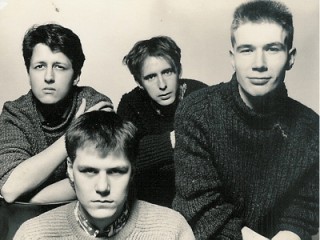
Del Amitri biography
Date of birth : -
Date of death : -
Birthplace : Glasgow, Scotland
Nationality : Scottish
Category : Arts and Entertainment
Last modified : 2012-04-26
Credited as : Music group, Waking Hours album, Always the Last to Know hit single
0 votes so far
Currie writes the majority of Del Amitri's material and almost always serves as the band's spokesperson. He comes across as clever, cynical, and bluntly modest. In an A&M press release, Currie mused: "Obviously a lot of our songs are quite poppy. But we always set out to make something that sounds like a cross between Neil Young, the Beatles, and the Undertones. It never ends up sounding like that--it always ends up sounding like a pop album, and quite bland." In another instance, the singer-songwriter compared his craft to dishwashing and juggling. The harder, more cynical side of Currie is revealed in his lyrics, as in the line from the album Waking Hours,"Whole generations thinking of themselves as infidels and pop stars/While the bomb loses patience we line up and just lean against the bar." Often his songwriting leans toward the dark and melancholy, whether he's reflecting on social problems or heartbreak.
As a teenager, Currie, with guitarist Iain Harvie, formed the band in Glasgow in 1983. They adopted the name Del Amitri ("from the womb" in Greek) and recruited Bryan Tolland on guitar and Paul Tyagi as a drummer. The fledgling band recorded "Sense Sickness" with the No Strings independent label, toured with groups such as the Fall and the Smiths, and recorded sessions with famed British DJ John Peel. By the time Del Amitri signed with Chrysalis Records to record their first album, a new line-up was in evidence, with Tolland joined by second guitarist David Cummings and drummer Brian McDermott replacing Tyagi.
Expectations for Del Amitri were high. Prior to recording their 1985 self-titled release, the band appeared on the cover of Melody Maker. The magazine labeled Del Amitri as the next British group expected to achieve international stardom. However, conflict subsequently arose between the band and Chrysalis, and the band's prospects skidded to a halt. In an attempt to revive their fortunes, an independent Del Amitri went on the road with the help of a large fan base, who booked and promoted Del Amitri shows themselves. In 1986 the band toured the United States playing borrowed instruments; the success of this tour resulted in a contract with A&M Records the following year.
In 1990 Del Amitri released its second album, Waking Hours, which Michael Rubiner described in Rolling Stone as an "exercise in melodic, midtempo guitar rock, leavened with folk and country," adding that "the record is more heartland fare than nouvelle cuisine: unhip, maybe an honest meal." After bemoaning the long lapse between Del Amitri's recordings, Stereo Review writer Parke Puterbaugh assessed the album as "honest, wise, and charming" and the band "as winsomely enthusiastic as ever." In the attempt to describe Del Amitri's music, other reviewers have drawn comparisons to Jackson Browne, Steely Dan, and the Beatles; in articles written during the early 1990s, they were often yoked stylistically to their labelmates, the Gin Blossoms. Yet Del Amitri's lyrics have always drawn especial praise from critics; People's Jeremy Helligar asserted that the "band's take on heartache has always sounded authentic and impressively clever." Michael Lipton noted in Request that Currie and Harvie "appear to draw from a bottomless well of inspiration."
Further proof that the band's fortunes were on the rebound came with their next recording. In 1992 the band produced Change Everything, an album that went platinum and included the Billboard Top 40 hit "Always the Last to Know." Writing for Los Angeles's Daily News, Bruce Britt called the recording "a refreshing collection of unabashed pop tunes." On this album, Currie, Harvey, Cummings, and McDermott were joined by keyboard player Andy Alston.When Del Amitri recorded their next album, Twisted, the band's roster included Currie, Harvie, and Alston, as well as newcomers Jon McLoughlin on guitar and Ashley Soan on drums. This album was touted as a solid follow-up to Change Everything as well as an artistic high point for the band. In a Billboard interview, Currie proudly noted the stylistic changes evident on this album: "If you're a melodic band, as we are, it's very easy to sound twee....This is the first time we've been able to make a record as raucous as we wanted to." Guitarist Iain Harvie pointed out the thematic shift in Twisted in an A&M press release: "On the previous album, Justin just sort of hid in his bedroom and wrote miserable songs....[Twisted]'s got two happy songs on it....For us, that's a regular party album."
With Twisted, A&M prepared to give Del Amitri the extra push needed to increase recognition. Product manager Brad Pollack described the band's identity problem in Billboard: "It's like, 'Is Del Amitri a band, a guy, an Italian dish?'" The record label planned to mount an extensive in-store promotion to lure record shoppers. Despite these problems, Del Amitri appears to have at long last found its audience. David Sprague noted in Billboard that the band has benefited from a growing "mature-yet-adventurous" group of adult listeners who support fringe bands such as Del Amitri; Sprague suggested, "Now that 'adult' and 'hip' can be used in the same description without a trace of irony, Glasgow's Del Amitri may finally attain its long-predicted American breakthrough." Del Amitri responded by pursuing business as usual. In 1996, after finishing yet another tour, the band returned to the recording studio.
















